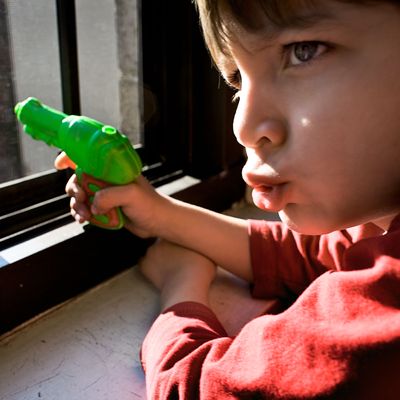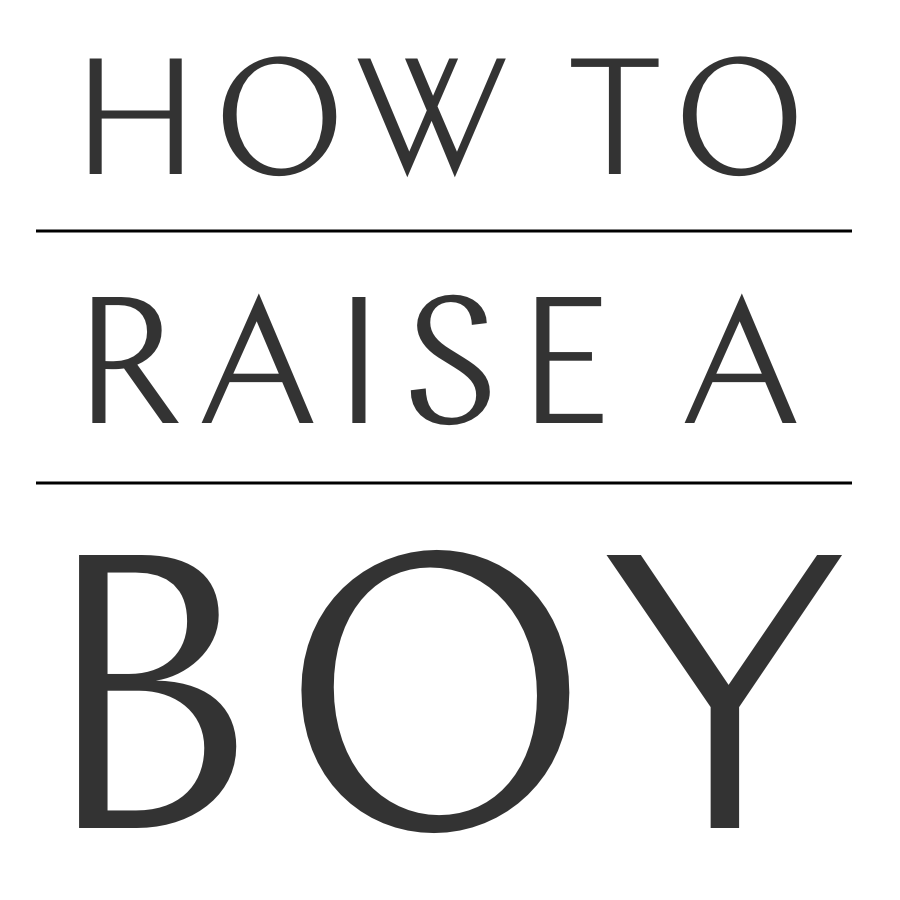
How to Raise a Boy is a weeklong series centered around this urgent question in the era of Parkland, President Trump, and #MeToo.
A week before the Parkland, Florida, school shooting that killed 17 people, my son lost his video-game privileges. Gray, who is 7, had been introduced to free internet video-game sites by his 10-year-old cousin while on vacation, and wore me down afterward with his persistent begging to let him play. The games he most wanted to play were shooting games. Not the abstract, pixelated, Space Invaders–style shooting games I grew up with, but the kind where the player has an AR-15-style rifle, and uses it to shoot at people.
Games that pop up first on these free internet game sites have names like Masked Forces, Bullet Force, Combat Reloaded, Pixel Gun Apocalypse, Afghan Survival, and Ghost Sniper. “Forget it,” I told Gray when he asked to play them. He knows how his parents feel about guns. We might allow water pistols, but the symbolism of a gleeful boy behind a realistic-looking killing weapon is too disturbing, especially considering our times. We have strict rules in our home about pointing anything that resembles a weapon at a family member or anyone else — even if it doesn’t actually shoot, but particularly if it is a Nerf weapon that shoots foam arrows or bullets. We had allowed Gray to play Minecraft, a video game that includes shooting at animals and zombies with a vaguely defined weapon that doesn’t seem very effective (you have to hit a chicken at least three times before it “dies”). The central focus of Minecraft is building, not shooting. But he grew obsessed with video games, and began sneaking onto the free sites for the gun games. We had to cut him off.
Gray’s interest in guns has been a small, nagging concern since he was 3 or 4. When we made it clear we would not buy him toy guns, he asked for and eventually earned a Nerf crossbow. Once, he drew back the crossbow, aimed it at his sister’s face at close range, and asked, “Do you want me to shoot you in the face?” (He lost the crossbow after that.) These moments make my heart drop; I see the way his desire to show power over others is reinforced when he’s holding a weapon. He doesn’t want to truly hurt his sister in any serious way, but like most kids he’s wanted to test out how that power feels. Where could I expect him to draw the line?
I am a professor of, among other things, gender studies. Before I had children I was a firm believer in the role of nurture over nature when it came to gender roles. I believed children took cues from the people around them, from media, and from the omnipresent, gendered, child-targeted advertising. I believed boys —and girls — learned our culture’s version of masculinity, including aggression and entitlement, from the world around them.
Then I had a son, followed by two daughters. All three of them have been raised by two moms, both of us educators, in a thoughtful, pacifist environment in which media consumption is monitored. But unlike my daughters, who enjoy dancing, glitter, and taking care of stuffed animals, Gray showed an interest in violence and weaponry at his earliest exposure. He is also the easiest to anger. The combination of these two traits — how he lights up when his grandfather talks about hunting gear, and his tendency to anger suddenly — worries me. I’m not sure what is developmentally appropriate and what is specific to him.
It’s a known fact among parents of boys, reaffirmed at every playground discussion, that boys will turn anything into a gun no matter how you parent. It goes beyond nurture. Like many boys his age, Gray can make anything remotely gun-shaped — a clothes hanger, Legos, a vacuum-cleaner attachment — into a firearm. There is nothing unusual about Gray’s fascination. But knowing that is not a comfort in the wake of a mass shooting, when my social media feed is packed with photographs of faces of murdered children, weeping family members, and traumatized survivors, and Gray points an imaginary gun at a kid across the playground and makes the firing sound with his mouth.
Gray doesn’t know about Newtown. He doesn’t know about Parkland. He caught a blip of news footage about the Pulse nightclub shooting before I quickly changed the channel, and didn’t press me for more information when I explained that “something really sad happened.” He is only 7, and my job as a parent at this stage is to shield him from knowledge of things like mass shootings.
But if I can’t talk to him about the status of gun violence, how can I explain to him how difficult it is for me to see him train a weapon on his sister — particularly when I see that it’s out of anger?
It’s not that I don’t understand what it’s like to be drawn to guns. I do. When I was 11 my parents sent me to an all-girls camp in North Carolina that specialized in horseback riding. I did not care for horses, but I fell in love with riflery. I learned how to clean, load, and shoot a .22 caliber rifle. There was one girl with a higher bull’s-eye ratio, but according to Nancy, the riflery counselor, I was the most consistent shot in camp. I loved shooting a gun. I skipped horseback riding to do double shifts at the riflery shack, and Nancy never turned me in. I got really good at it. I couldn’t believe I got to do this dangerous thing, to excel at it. But I always knew there was a huge leap between what I was doing in the controlled environment of the riflery shack and the terrifying gun violence on the urban streets near where I lived.
I want Gray to experience this if he wants to. When he is a little older I hope to find him a camp that includes marksmanship as a sport, and to let him hold and fire a real gun. Anyone who has been a child understands that forbidding something can make a child’s interest in it multiply. And the sport of marksmanship has benefits for young people like Gray who sometimes need help controlling their emotions. In order to shoot well, you need to be perfectly calm. You learn how to still your brain and your body. When I look back on my hourlong stints in the riflery shack, I remember leaving with a centered feeling that I now might feel after a yoga class.
I would rather have my son shoot a real .22 caliber rifle that he needs to carefully reload after each shot in a responsible way than play video games in which he shoots an imaginary semiautomatic rifle in a careless way. I would rather him shoot real bullets at targets than simulated bullets at a simulated person who is left bleeding on the ground as a result. There is something too realistic about these video games, something that trains its players in brutality over skill. I know Gray will discover Call of Duty or its equivalent someday, but in the meantime I will attempt to shield him from games that numb their players to the concept of bloodshed like I shield him from the news.
I’m not worried about my son becoming a gun enthusiast as an adult. I am not worried he will become a perpetrator of gun violence. Violence is the product of unchecked anger, and Gray has parents and educators who believe in addressing and defusing anger. We believe in a world of “us,” not a world of “us vs. them.” Empathy is a core value in his school as well as his family. I work hard to teach my son that being male does not entitle him to certain treatment, and we have placed him in a social environment that values cultural pluralism, that unites rather than divides. He has a large family and a lot of caring, thoughtful people looking out for him and his development, and we are lucky to have access to the resources we might need in the case of any red flags.
What I’m worried about is that I know the day will soon come when I can’t shield him from news stories. Soon my son will understand that despite everything I have told him, there are people who don’t want to separate the feeling of power they get from acting out in gun play and the feeling of power they get from murdering real human beings. And the worst fact of all: that killing machines like AR-15s are sold in regular stores, that anyone can buy them, and our government refuses to enact the laws that would protect our children from them. That random gun violence happens not infrequently, but all the time.
This will terrify him, but not only because of the fear of being shot or of someone he loves being shot. It will terrify him because it will make no sense to him. And when he asks me to explain it, I will not know what to say.





